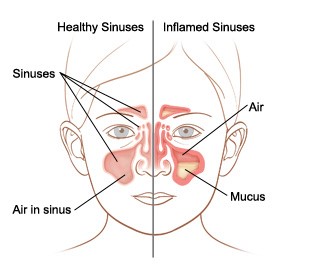Sinus Surgery- Functional Endoscopic Sinus Surgery
Jump to:
What are sinuses?
Sinuses are air-filled spaces in the face and head. Four pairs of sinuses connect to the nose by small drainage paths. Healthy sinuses make mucus, which drains into the nose. The nose also makes mucus. Swelling can block the flow of mucus through the nose or sinuses. This may cause bacteria to grow which could lead to a sinus infection (sinusitis).
What is Functional Endoscopic Sinus Surgery (FESS)?
- FESS is done to open the blocked passages between the sinuses and the nose. This will help the mucus drain. A small tube with a light and camera, called an endoscope is used to view the inside of the nose. The endoscope and other tools are used to clear or open the blocked passages. After this surgery, mucus can drain more easily and air can flow better.
- Surgery is done in the operating room and takes about one to three hours depending on how much infection is found. Your child will be given medicine to help them sleep through the surgery.
- Most children go home from the hospital on the same day.What do I need to know before my child's surgery?
What do I need to know before my child's surgery?
- Do not give your child these medicines at least 2 weeks before surgery. They increase the chance of bleeding during surgery.
- Ibuprofen (Motrin®, Advil®, Pediaprofen®)
- Naproxen
- Aspirin - You may give Tylenol as needed. Do not stop any prescribed medicines without talking with your doctor. If your child is put on any medicine other than an antibiotic before surgery, please call our office.
- We try to schedule surgery as soon as possible. If you have not heard from us in 2 weeks, please call our office.
- Surgery is best done when your child is healthy. If your child has signs of illness, call your child’s doctor or nurse right away. Surgery may be cancelled if your child is ill or has a fever.
What do I need to know after my child’s surgery?
What to expect:
- The inside of your child’s nose may feel stuffy or sore.
- Your child may have pinkish or dark red blood-tinged nasal drainage for 3 to 5 days after surgery.
- Your child may feel like there is something in their nose.
- Your doctor will tell you if a nasal spray is needed.
- The doctor will let you know when to re-start any nasal medicines.
Pain
- Your child may have a sore nose after surgery.
- You may give acetaminophen or ibuprofen as needed for pain.
- Your doctor may recommend other pain medicines for your child.
- Be sure to follow the directions on the bottle label of all medicines you give your child.
Diet
- Your child may drink clear liquids when fully awake.
- Start a normal diet when your child is hungry and ready to eat.
Activity
- Your child should blow their nose gently for the first 1 to 2 weeks after surgery.
- Your child may need to stay home from school for 3 to 5 days.
- No contact sports or swimming for 2 weeks after surgery.
- Your child may play normally when the pain is better.
Follow up care
If your child does not already have a post op visit scheduled, call your doctor’s office. Your child needs to be seen in the ENT clinic in 2 weeks.



